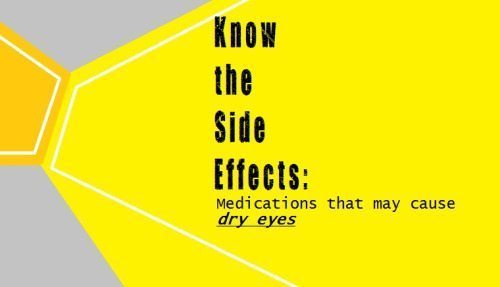Do you suffer from dry eye? Do you understand how dry eye occurs, or why some people develop it while others don’t? Dry eyes is a complex condition and multi-faceted. However, dry eyes can be caused from the medication you use. So if you know where your dry eyes are coming from, it becomes much easier to control the symptoms.
As optometrist Dr Alex Du comments, “A lady had come in complaining of dry eyes. She had dry symptoms for the last two months and did not understand why. During history taking, we realised the only thing that had changed was her using Naphcon-A”
“Now Naphcon-A is a great anti-histamine for the eyes. It clears up the redness and makes the eye stop itching. However once the effects wear off, the side effects of the drug kicks in. The most well known side effect is that it slows it down tear production.”
“Sometimes it is inevitable to have a small degree of side effects with the medication we take. But the discomfort we experience could be due to the side effects of the medications we take. Fortunately when we stopped using Naphcon-A, her dry eyes actually got better. It’s not always this simple.”
Here are some medication that may contribute to dry eye symptoms. Please take note, not all of the type of medication listed may always cause dry eyes, but some:
- Anti-histamine
- Nasal decongestants
- Tranquilisers
- Certain blood pressure control medication
- Parkinson’s Disease Treatment
- Parkinson’s Disease Treatment
- Birth Control Pills
- Anti-depressants
If you are experiencing dry eyes, please come in for a comprehensive dry eye assessment. Medication may be one of the reasons but obviously there can be many other causes. Don’t suffer in silence.
For more information on eye health and eye conditions or to find your local Eyecare Plus optometrist visit: www.eyecarevision.com.au
About optometrists:
Optometrists are experts in vision care who diagnose, manage and treat a wide range of vision problems, eye diseases and ocular conditions. By prescribing spectacles, contact lenses, vision aids and other treatments, optometrists help their patients maximise and retain good vision for life.

